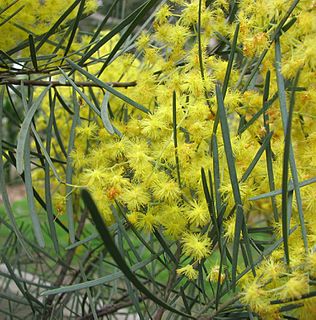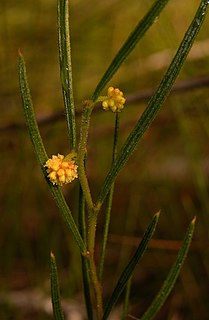
Acacia cultriformis, known as the knife-leaf wattle, dogtooth wattle, half-moon wattle or golden-glow wattle, is a perennial tree or shrub of the genus Acacia native to Australia. It is widely cultivated, and has been found to have naturalised in Asia, Africa, North America, New Zealand and South America. A. cultriformis grows to a height of about 4 m (13 ft) and has triangle-shaped phyllodes. The yellow flowers appear from August to November in its natural range. Its attractive foliage and bright flowers make it a popular garden plant.

Acacia xiphophylla, commonly known as snakewood or snake-wood, is a tree in the family Fabaceae that is endemic to Western Australia. The indigenous group the Martuthunira, Ngarluma and Yindjibarndi peoples know it as marrawa, the Kariyarra know it as puluru and the Jiwarli know it as pukarti.

Acacia acanthoclada, commonly known as harrow wattle, is a low, divaricate, highly branched and spinescent shrub that is endemic to Australia.

Acacia neriifolia, also known as the oleander wattle, silver wattle or pechy wattle, is a tree in the genus Acacia native to north eastern Australia. It is common in the Moonbi Ranges.

Acacia brownii, commonly known as heath wattle, is an erect or spreading shrub which is endemic to eastern Australia.

Acacia oxycedrus, commonly known as spike wattle, is an erect or spreading shrub which is endemic to Australia.

Acacia suaveolens is a shrub species endemic to Australia. It grows to between 0.3 and 3.5 metres high and has smooth purplish-brown or light green bark and has straight or slightly curving blue-green phyllodes The pale yellow to near white globular flower heads generally appear between April and September in its native range. These are followed by flattened, bluish oblong pods which are up to 2 to 5 cm long and 8 to 19 mm wide.

Acacia mitchellii, commonly known as Mitchell's wattle, is an erect or spreading shrub which is endemic to Australia. It grows to up to 2 metres high and has small bipinnate leaves. The pale yellow globular flowerheads appear in groups of 1 to 3 in the axils of the phyllodes followed by straight or curved seed pods which are 1.8 to 5 cm long and 4 to 8 mm wide.

Acacia lineataA.Cunn. ex G.Don, commonly known as streaked wattle or narrow lined-leaved wattle, occurs naturally inland eastern Australia. The genus Acacia is the largest genus of flowering plants in Australia, containing around 1000 species throughout a diverse range of environments from coast to desert.

Acacia flocktoniae is a shrub species that is endemic to Australia.

Acacia cognata, commonly known as bower wattle, river wattle or narrow-leaved bower wattle, is a tree or shrub species that is endemic to south eastern Australia.
Acacia beckleri, or Barrier Range wattle, is a plant in the genus Acacia native to Australasia, typically Australia. It is named after Dr Hermann Beckler, the botanist on the Burke and Wills expedition in 1861 and it was he who collected the type specimen. The common name refers to the Barrier Range in the Broken Hill area, western New South Wales. This species is similar to A. notabilis and A. gladiformis.

Acacia ausfeldii, commonly known as Ausfeld's wattle or whipstick cinnamon wattle, is a shrub species that is endemic to south-eastern Australia. It grows to between 1 and 4 metres high and has phyllodes that are 2 to 7 cm long and 2 to 6 mm wide. The yellow globular flowerheads appear in groups of two or three in the axils of the phyllodes in August to October, followed by straight seed pods which are 4 to 9 cm long and 2 to 4 mm wide.

Acacia phasmoides, the phantom wattle, is a shrub species that is endemic to south-eastern Australia.

Acacia bynoeana, known colloquially as Bynoe's wattle or tiny wattle, is a species of Acacia native to eastern Australia. It is listed as endangered in New South Wales and as vulnerable according to the Environment Protection and Biodiversity Conservation Act 1999.

Acacia linifolia, known colloquially as white wattle, or flax wattle, is a species of Acacia native to eastern Australia.

Acacia caesiella, commonly known as tableland wattle, bluebush wattle or blue bush, is a shrub or small tree that is endemic to eastern Australia.

Acacia burkittii is a species of wattle endemic to Western Australia, South Australia and western New South Wales, where it is found in arid zones, and is a perennial shrub in the family Fabaceae. Common names for it include Burkitt's wattle, fine leaf jam, gunderbluey, pin bush and sandhill wattle. It has also been introduced into India. Previously this species was referred to as Acacia acuminata subsp. burkittii, but is now considered to be a separate species. Grows in mallee, eucalypt and mulga woodland or shrubland, often on sandhills.

Acacia dawsonii, also known as Dawson's wattle or poverty wattle or mitta wattle, is a shrub of the genus Acacia and the subgenus Plurinerves found along parts of the east coast of Australia

Acacia trineura, known colloquially as three-nerve wattle or three nerved wattle or green wattle, is a species of Acacia native to south eastern Australia.




















